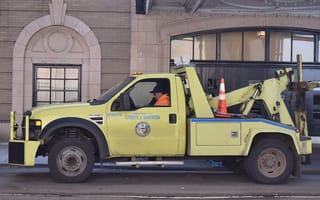
Once upon a time, on a cold night in November, Michael Sandoval decided to drive to pick up his family’s pad thai. Traveling to and from the restaurant took about 10 minutes, he said, but searching for a street parking space stretched to 25 in his North Side neighborhood of Uptown, which he said is notoriously the worst for finding street parking.
“My wife and I would be in a perfectly good mood, and then we would do something crazy, like go pick up takeout,” Sandoval told Built In. “We’d come back inside, our food would be cold and we’d end up being aggravated with one another. It’s one of those things where, there has to be a better way.”
Sandoval’s lack of parking spurred ParKarma, a new parking app that allows drivers to showcase their public, on-street parking spaces to others users in Chicago.
Based on the “take a penny, leave a penny” concept, ParKarma users can drop a pin on available street parking spaces, showcasing the location and length of time the area has been open. Individuals who share their free space rack up “karma” points, which qualifies them to see available street parking faster than other users. In the month since ParKarma launched, more than 120 users have downloaded the app, Sandoval said.
The effort represents the third startup launched by Sandoval, who, by day, works as a digital marketer at the HomeX residential contractor app.
“It’s all about just really changing the stigma associated with street parking,” Sandoval said. “Making it — I know this sounds ambitious — an enjoyable community experience.”
The effort is perhaps overdue.
Over the last 20 years, Chicagoans have been “reserving” free parking spaces with fold-out lawn chairs, garden gnomes and other paraphernalia, calling “dibs” on the street spots. In 2018, Sandoval said the city reported that 38 percent of individuals who own a car on the North Side of Chicago lack garages or lots to park in, forcing them to weave through side streets for places to curb their car. Last year, a 16-year-old was shot in a parking dispute.
The lack of parking isn’t limited to Chicago.
In 2014, a similar peer-to-peer parking app was launched to help drivers navigate the crowded streets of Boston. Named Haystack, Sandoval said the founder made a “quarter of a million dollars” through the paid street parking app, before the city shut it down for illegally allowing private individuals to sell public parking spaces. Unlike Haystack, Sandoval said that, because ParKarma is free, its operation is no different than individuals who find a parking space on Chicago streets organically.
“Nobody technically owns the spot,” Sandoval said. “That’s something we outlined, which is play nice with one another. Just because you’re using this app doesn’t mean that you have rights to a parking space.”
Going forward, Sandoval said ParKarma aims to eventually transition to a subscription model, wherein users pay a $5 fee to be shown free spaces faster. The cash would be used to pay for the cost of using Google Maps’ API — which powers ParKarma’s map system — and eventually could be pooled to purchase discounted spaces at private lots, similar to how the Chicago-based SpotHero and the Baltimore-based Parking Panda operate. Yet, unlike the competition, Sandoval said ParKarma users generally aren’t looking to park near concert venues, hospitals or football games — they just want free street parking in their community.
“This is more about changing the face of parking in Chicago,” Sandoval said.




